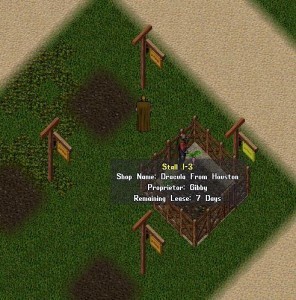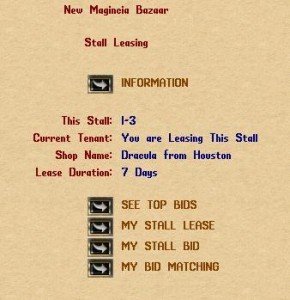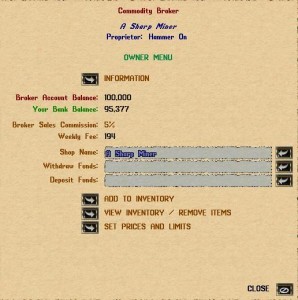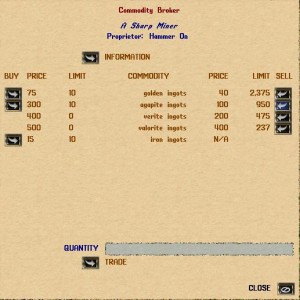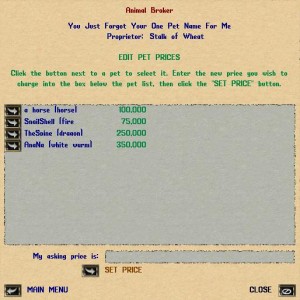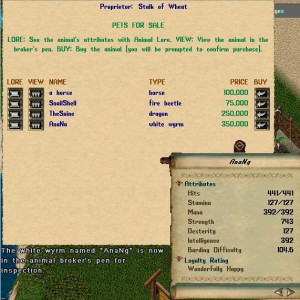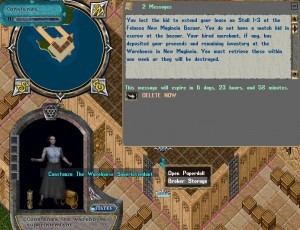(From the original .pdf file, no longer accessible)
The New Magincia Bazaar is a dynamic center for commerce that offers buyers and sellers alike the opportunity to trade in extraordinary new ways.
The Bazaar of New Magincia consists of 50 stalls that will be leased for one week at a time by prospective merchants. These stalls are available to renters for commerce. The Bazaar Authority keeps expert brokers on staff, who are available for hire by those leasing stalls in the bazaar. These brokers act on behalf of the stall renter to buy and sell merchandise. Brokers are of two types: Animal Brokers, and Commodity Brokers.
Animal Brokers will take possession of pets and sell them at a price determined by the owner, charging a small commission for each sale, plus a small pro rata commission on the sale price of unsold inventory. Prospective customers will be able to preview animals for sale in specially designed pens, and see their vital stats.
Commodity Brokers are able to both buy and sell commodity items for their employer. They work on commission similarly to Animal Brokers: they receive a small percentage of each purchase or sale, and they charge a pro rata commission on all saleable inventory.
The rules for stall leasing make provisions for extending leases, as well as relocating stalls within the bazaar, so that dedicated merchants may establish and maintain a long-term presence at the Bazaar. As a public service the Provisional Council offers gratis storage for all stall inventory and funds for up to one week after a stall lease expires. Note: This does not include items your broker is wearing.
Overview – The Bazaar Grounds
Located throughout New Magincia are 50 small square dirt patches. On the north edge of each patch is a sign on a signpost. The signs identify each stall with a letter and a number. The Bazaar Authority updates these signs with pertinent information about each stall: who is leasing it, the name of the shop occupying the stall, and when the stall will next be auctioned for a new lease.
Those wishing to lease stalls may use the signs (by double-clicking). The user is presented with more detailed information about the stall. Using menu options on the stall sign interface, users may place, adjust, and retract bids. Renters may review the details of their lease, plus hire and release brokers.
When a stall is rented and a broker is hired, the broker erects a temporary structure (either a fenced-in animal pen or a trading floor) in the stall, and remains with the stall for the duration of hire. The employer and prospective customers interact with the broker to conduct business.
Stall Leasing
Whenever a stall is not rented, the Bazaar Authority will accept new bids for that stall for up to 12 hours. When a new lease is established, the winning bidder gains exclusive use of the stall for 7 days, plus a randomly chosen amount of extra time up to 12 hours. The Bazaar Authority never releases details about the precise end time of an auction, in order to curb “bid sniping” and other unfair practices.
Prospective merchants may have one active bid at a time. This bid may be a bid for a specific stall, or for the next available stall. Bids must be an even multiple of 1,000gp, and the minimum bid allowed is 1,000gp. The user simply chooses the amount to bid, and whether the bid is for the specific stall or the first available stall. Bids remain in effect for as long as the user wishes. Bidders may retract or adjust their bid amounts at any time.
All funds covering stall bids are held in escrow by the Bazaar Authority. There are no fees for placing, adjusting, or retracting bids.
When determining the winning bid for a stall, the system considers all bids placed for the first available stall, plus bids placed for the specific stall. In the case of ties, bids for the specific stall win over bids for the next available stall. If multiple users have bid exactly the same amount, then the oldest bid placed wins the tie.
The user interface will display the top bids that apply to any stall at the current time, and will indicate whether each bid is a specific-stall bid or a next-available bid. The source of all bids is always kept private.
Merchants wishing to lease a stall continuously for more than 7 days may place some funds in reserve with the Bazaar Authority to match the top bid on that stall. When their lease ends and the stall is re-auctioned, if the top bid is not higher than the match funds reserved for that stall, then the current tenant gains a new 7-day lease on the stall but the amount of the top bid is deducted from the reserved match funds. The top bid remains in effect for future auctions. A merchant’s bid matching information is kept private.
A merchant who is leasing a stall may choose to place a bid on another stall. If the user wins a new lease on a different stall, then the broker will relocate the shop to the new stall and begin a new 7-day lease. The lease on the old stall is abandoned, and the Bazaar Authority will auction a new lease for the vacated stall within 12 hours.
Once the lease is established, the renter need simply select the desired broker type to establish a shop. There are three styles of Animal Broker stalls and three styles of Commodity Broker styles. The user may preview the stall using the menu before choosing the one desired. Also, so long as a broker’s inventory and account are empty, the renter may quickly and easily replace the broker with a different style and/or a different shop type.
Commodity Brokers
Commodity Brokers buy and sell commodities of most types on behalf of the employer.
When a merchant employs a Commodity Broker, he must provide the broker with operating funds and inventory, then set prices and stock limits. The broker charges a commission on each sale, and periodically charges a small fee based on the asking price of unsold inventory.
After hiring the Commodity Broker, the player must provide a sample of the commodities for the broker to trade. After the broker has added the sample to its inventory, the employer may then instruct the broker to buy that item from other players using provided funds, and/or sell that item to other players. The employer sets prices and limits; for example, the player may instruct the broker to buy up to 5,000 iron ingots at 10gp per ingot. Brokers are able to buy and sell the same commodity at the same time, so long as the asking price is higher than the bid price.
The employer may transfer funds and merchandise to and from the broker at any time. The employer may also adjust prices and stock limits at any time. Inventory may be transferred to the broker in either item or deed form, and all inventory removed from the broker’s inventory is returned in deed form.
When other players visit the broker, the broker will present them a list of all commodities it will trade, along with the prices and quantity limits for each.
To buy from the broker, click the button next to the commodity name on the left-side of the interface, enter the amount desired, and click the button labeled “TRADE”. To sell an item to the broker, click the corresponding button on the “SELL” side of the interface, enter the quantity, and click the “TRADE” button.
The broker will ask for confirmation of each transaction. The broker delivers all purchased goods in deed form. When selling to the broker, it will accept commodities in deed form or in item form.
Animal Brokers
Animal Brokers sell tamed animals on behalf of the employer. The employer transfers pets from the stables into the pet broker inventory and sets prices on them. The employer may transfer pets back into the stables or adjust pet prices at any time.
Customers may preview the pets, and the broker provides customers with Animal Lore information about each pet for sale. The broker takes a 5% commission for each animal sold, and incrementally charges a weekly fee on all unsold inventory.
Warehouse Storage
When a stall lease ends, the hired broker will transfer any remaining inventory and funds into the Warehouse of New Magincia. The broker’s former employer has one week to reclaim those animals or commodities, and funds. To claim these goods, visit a Warehouse Superintendant and ask to retrieve your items. Note: The broker retains any clothing and equipment worn, they are not recoverable.

